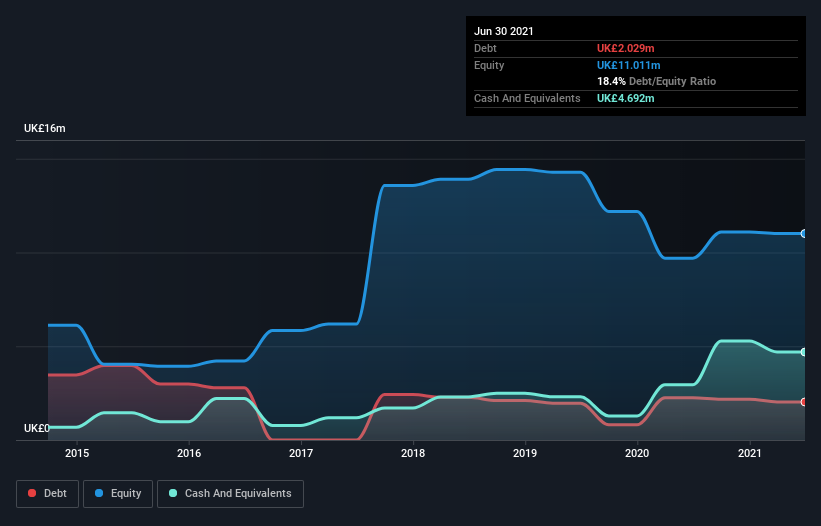Is Surgical Innovations Group (LON:SUN) Using Too Much Debt?
Howard Marks put it nicely when he said that, rather than worrying about share price volatility, 'The possibility of permanent loss is the risk I worry about... and every practical investor I know worries about.' When we think about how risky a company is, we always like to look at its use of debt, since debt overload can lead to ruin. As with many other companies Surgical Innovations Group plc (LON:SUN) makes use of debt. But the real question is whether this debt is making the company risky.
What Risk Does Debt Bring?
Generally speaking, debt only becomes a real problem when a company can't easily pay it off, either by raising capital or with its own cash flow. Part and parcel of capitalism is the process of 'creative destruction' where failed businesses are mercilessly liquidated by their bankers. While that is not too common, we often do see indebted companies permanently diluting shareholders because lenders force them to raise capital at a distressed price. Of course, plenty of companies use debt to fund growth, without any negative consequences. When we examine debt levels, we first consider both cash and debt levels, together.
View our latest analysis for Surgical Innovations Group
What Is Surgical Innovations Group's Net Debt?
As you can see below, Surgical Innovations Group had UK£2.03m of debt at June 2021, down from UK£2.25m a year prior. However, it does have UK£4.69m in cash offsetting this, leading to net cash of UK£2.66m.
How Strong Is Surgical Innovations Group's Balance Sheet?
According to the last reported balance sheet, Surgical Innovations Group had liabilities of UK£4.06m due within 12 months, and liabilities of UK£998.0k due beyond 12 months. On the other hand, it had cash of UK£4.69m and UK£1.53m worth of receivables due within a year. So it can boast UK£1.16m more liquid assets than total liabilities.
This surplus suggests that Surgical Innovations Group has a conservative balance sheet, and could probably eliminate its debt without much difficulty. Succinctly put, Surgical Innovations Group boasts net cash, so it's fair to say it does not have a heavy debt load!
We also note that Surgical Innovations Group improved its EBIT from a last year's loss to a positive UK£111k. When analysing debt levels, the balance sheet is the obvious place to start. But it is Surgical Innovations Group's earnings that will influence how the balance sheet holds up in the future. So when considering debt, it's definitely worth looking at the earnings trend. Click here for an interactive snapshot.
Finally, a business needs free cash flow to pay off debt; accounting profits just don't cut it. While Surgical Innovations Group has net cash on its balance sheet, it's still worth taking a look at its ability to convert earnings before interest and tax (EBIT) to free cash flow, to help us understand how quickly it is building (or eroding) that cash balance. Over the last year, Surgical Innovations Group actually produced more free cash flow than EBIT. There's nothing better than incoming cash when it comes to staying in your lenders' good graces.
Summing up
While it is always sensible to investigate a company's debt, in this case Surgical Innovations Group has UK£2.66m in net cash and a decent-looking balance sheet. The cherry on top was that in converted 154% of that EBIT to free cash flow, bringing in UK£171k. So we don't think Surgical Innovations Group's use of debt is risky. There's no doubt that we learn most about debt from the balance sheet. But ultimately, every company can contain risks that exist outside of the balance sheet. Be aware that Surgical Innovations Group is showing 3 warning signs in our investment analysis , and 1 of those is potentially serious...
Of course, if you're the type of investor who prefers buying stocks without the burden of debt, then don't hesitate to discover our exclusive list of net cash growth stocks, today.
This article by Simply Wall St is general in nature. We provide commentary based on historical data and analyst forecasts only using an unbiased methodology and our articles are not intended to be financial advice. It does not constitute a recommendation to buy or sell any stock, and does not take account of your objectives, or your financial situation. We aim to bring you long-term focused analysis driven by fundamental data. Note that our analysis may not factor in the latest price-sensitive company announcements or qualitative material. Simply Wall St has no position in any stocks mentioned.
Have feedback on this article? Concerned about the content? Get in touch with us directly. Alternatively, email editorial-team (at) simplywallst.com.


